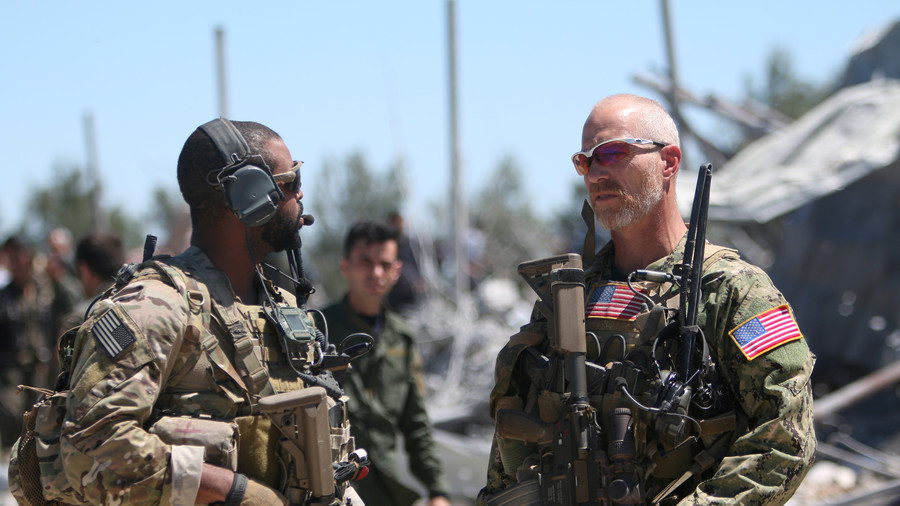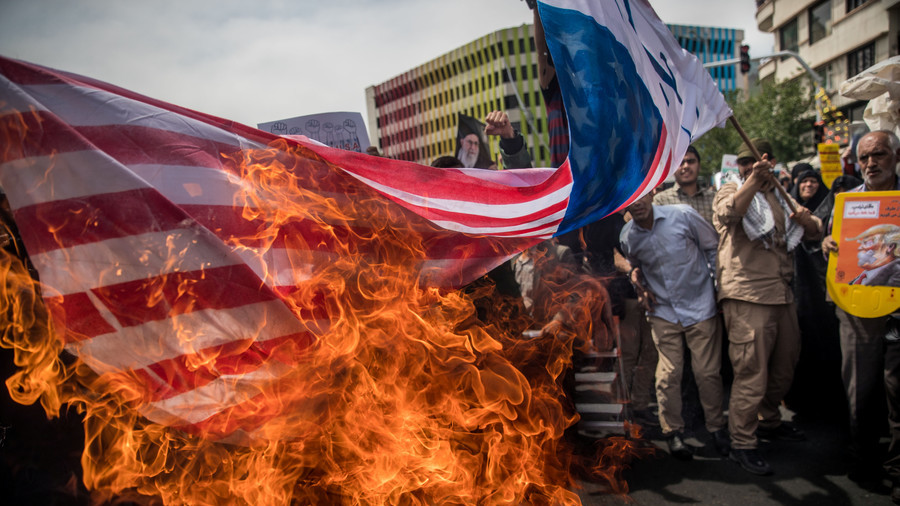US
Lays Out 12 Demands For A New Nuclear Deal With Iran
21
May, 2018
The
Trump administration escalated its demands on Iran on Monday while
giving Tehran a possible loophole if it wants the US to return to the
nuclear deal which President Trump unilaterally cancelled last month,
laying out a list of demands that Iran has to satisfy for the deal to
be restored, including a stop to all uranium enrichment and halt to
Iran's support for militant groups in the region.
The
administration’s demands were outlined in a speech by Secretary of
State Mike Pompeo, which for the first time spelled out all of the
administration’s requirements for a new agreement. Pompeo
laid out an onerous list of 12 "basic requirements" on Iran
which toughened the nuclear demands and called for a wholesale change
to Iran’s military posture in the region, that he says should be
included.
Among the demands listed by Pompeo was that Iran must "stop enrichment" of uranium and never pre-process plutonium. Iran must also allow nuclear "unqualified access to all sites throughout the country."
Pompeo
also demanded that Iran must withdraw all of its forces from Syria,
end its support for militant groups like Hezbollah in Lebanon, stop
sending arms to the Houthi militia in Yemen, release all U.S.
citizens, and cease its threats to destroy Israel.
Some
of the requests were a bit more... bizarre:
Pompeo calls on Iran to rejoin the “League of Nations” (which existed from 1920-1946)
As
the WSJ
notes,
the 12 asks mark a fundamental change from the 2015 agreement between
Iran and six world powers that President Donald Trump abandoned
earlier this month but which European leaders have sought to
preserve. That agreement allowed Iran to enrich uranium under
detailed arrangements in return for sanctions relief.
Still,
while the secretary of state said that the administration wouldn’t
try to renegotiate the old Iran deal. Instead, he did just that by
outlining the 12 basic requirements for the new deal.
“Relief from sanctions will come only when we see tangible, demonstrated, and sustained shifts in Tehran’s policies,” Mr. Pompeo said in prepared remarks. “We acknowledge Iran’s right to defend its people. But not its actions which jeopardize the world’s citizens.”
Pompeo
said the demands were needed because of the broad nature of what he
called Iran’s malign behavior. The U.S., he said, didn’t create
the need for the demands, Iran did.
That
said, it's unlikely Iran will comply: critics say that the new
approach is nonnegotiable and won’t garner strong support in
Moscow, Beijing or European capitals.
“It’s a pipe-dream to believe the administration could achieve its wish-list of unrealistically ambitious negotiating objectives,” said Robert J. Einhorn, a former State Department official who was involved in Iran negotiations during the Obama administration.
Einhorn
said the Trump administration’s new sanctions wouldn’t be as
effective as the ones that the Obama administration was able to put
in place with the support of U.S. allies and other nations.
Failing
to reach an agreement on renegotiation, Pompeo threatened that the US
would impose the "strongest
sanctions in history" on
Iran if the country failed to enter into a new nuclear deal on
American terms
We
are confident that China, Russia and Europe are just waiting for this
to happen so they can provide Iran with all the goods and services
the nation may need now that it has been blacklisted by the US, Saudi
Arabia and Israel.
Checking Pompeo's Iran ultimatum: Who did more to turn Syria into terror-exporting 'kill zone'

Pull out of Syria? Bare all to IAEA? Why 12-point US list for Tehran is ‘ultimatum’ meant to fail

The
US has laid out 12 demands for Iran that it says Tehran must meet for
a new nuclear deal. Problem is, telling Iranian troops out of Syria
and dictating what nuclear watchdog inspects doesn’t sound like a
real roadmap for peace
US
Secretary of State Mike Pompeo made the
White House’s stance crystal clear Monday, calling the nuclear
agreement between Tehran and six world powers a “loser.” President
Donald Trump has already pulled the US out of the landmark deal
earlier this month. A new deal should be drawn up, Pompeo asserted,
while laying out 12 “basic
requirements.” Many
of those were predictable, such as requiring Tehran to “stop
enrichment of uranium and never preprocess plutonium” –
because obviously, the International Atomic Energy Agency (IAEA) is
not good enough to hold Iran to its word.
One
major point used as a bargaining chip is, however, entirely unrelated
to the Iranian nuclear program. It reads: “Iran
must withdraw all forces under Iranian command from Syria.”
The
demand conveniently ignores the fact that Iranian troops were invited
by the Syrian government and have been helping fight Islamic State
(IS, formerly ISIS/ISIL) on the ground – while the US
troops, stuck in
Syria indefinitely, were not. “Nobody
invited them there,”Russian
Ambassador to the UN Vasily Nebenzya said in
February, reminding the world that their presence was illegal. It’s
not hard to guess which forces the Syrian government wants to keep
and which it wants to be gone, as it battles the
remaining pockets of Islamist militants.
Another
US demand is that Iran must “respect
the sovereignty of the Iraq government and permit the disarming,
demobilization, and reintegration of Shia militias.” Just
as in Syria, Iranian troops are in Iraq with the approval of Baghdad,
and the country’s Popular Mobilization Forces (PMF) even receive
funding and training from Iran and have been declared part of
Iraq’s security apparatus. So why would Iranian troops suddenly
need to disband and leave?
Then
there’s the fact that the US seems to believe it’s perfectly fine
to try to establish a new deal which abides by 12 demands designed by
Washington – despite Washington being the sole party to withdraw
from the original deal. The other signatories – the UK, France,
Germany, China, and Russia – are still committed to the 2015 JCPOA.
Although
the IAEA, tasked with inspecting Iran’s compliance under the deal,
has repeatedly stated that Tehran is implementing its commitments,
the US apparently distrusts international watchdog’s expertise.
That’s according to the list of demands saying how the Iranian
nuclear program should be inspected.
“First,
Iran must declare to the IAEA a full account of the prior military
dimensions of its nuclear program, and permanently and verifiably
abandon such work in perpetuity. Second, Iran must stop enrichment
and never pursue plutonium reprocessing. This includes closing its
heavy water reactor. Third, Iran must also provide the IAEA with
unqualified access to all sites throughout the entire
country,”boomedPompeo,
speaking Monday at the Heritage Foundation, a right-wing Washington
think tank.
One
may almost forget the IAEA is not a lapdog of Washington, but an
international body. Why the US now gets to decide the scope and
methods of its work is unclear.
Of
course, there is also a whole array of demands to scale back Iranian
military programs and alleged support of militant groups. US accuses
Iran of sponsoring terrorism, including by helping the Palestinian
group Hamas and even, allegedly, Taliban and Al-Qaeda. That these
groups are overwhelmingly Sunni while the Iranian government in Shia
is overlooked, by accident or deliberately.
The
mentioned “threatening
behavior against its neighbors,” the “firing
of missiles” and “destructive
cyberattacks” strangely
mirror Washington’s own actions in the region, including some that
have been aimed against
Iran.
Crucially,
there’s little doubt that the Trump administration understands Iran
would outright reject most, if not all, of the listed demands, which
brings the purpose of the entire list into question.
“Secretary
Pompeo’s speech has not demonstrated how walking away from the
JCPOA has made or will make the region safer from the threat of
nuclear proliferation, or how it puts us in a better position to
influence Iran’s conduct in areas outside the scope of JCPOA. There
is no alternative to the JCPOA,” EU
foreign policy chief, Federica Mogherini, said Monday commenting on
Pompeo’s list. Others said the US list was outright destined to
fail – on purpose.
“I
think ultimatum is the right word… When you deliver an ultimatum,
its purpose is to have it rejected,” former
US diplomat Jim Jatras told RT. “There
are people in the Trump administration, who want the regime change in
Iran – it’s that simple, and they want Iran to reject their
terms.”
Jatras
believes it’s too early to tell at this stage if US threats against
Iran are merely “noise” and
pressure tactics like the one used against North Korea, but he says
even that pressure could backfire and serve as a positive effect for
Tehran by“forcing
the Europeans to pull even farther away from the US than they
have.” The
worst case scenario, he says, is Washington proceeding with a
unilateral military action aimed at regime change.
“As
you can imagine, Iran will not agree to any of Washington’s
demands,” Hamed
Mousavi, professor of political science at the University of Tehran,
told RT. “It
is Iran that should be asking the US why it has not fulfilled its
side of the agreement when Iran has fully complied with its
obligations under the nuclear deal. Why should Iran negotiate with an
administration that is not abiding by an international agreement that
is the result of years of intense diplomacy?”




No comments:
Post a Comment
Note: only a member of this blog may post a comment.